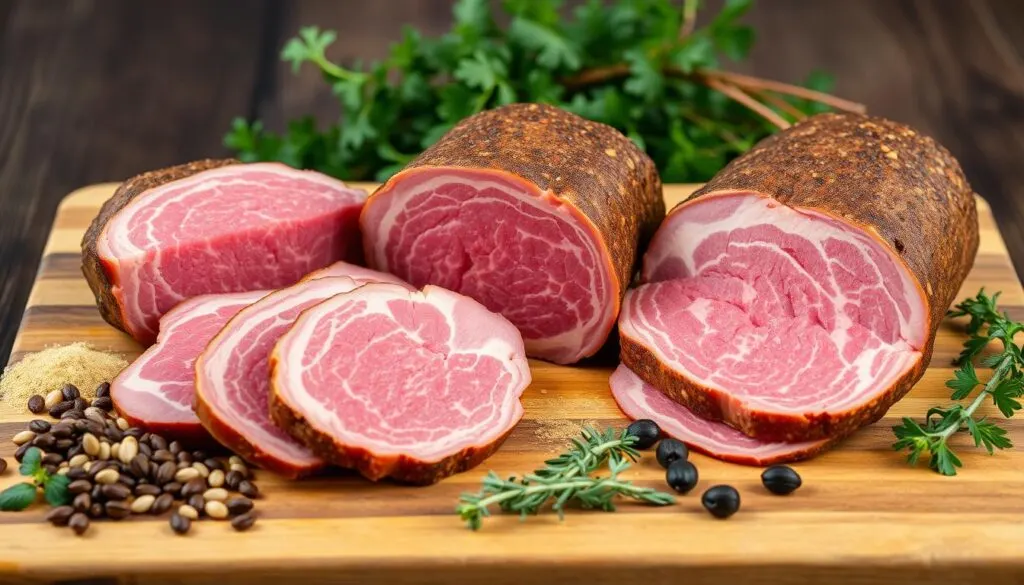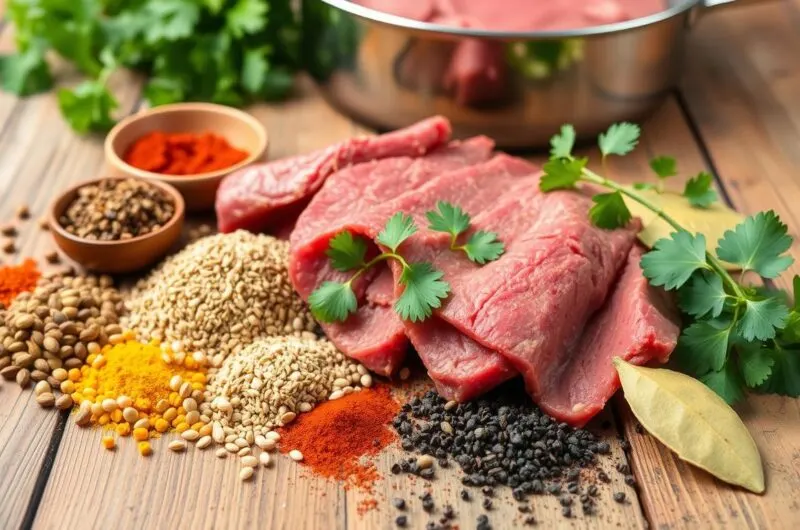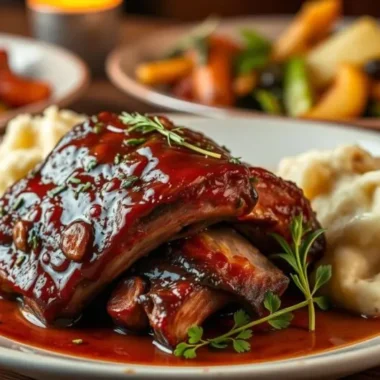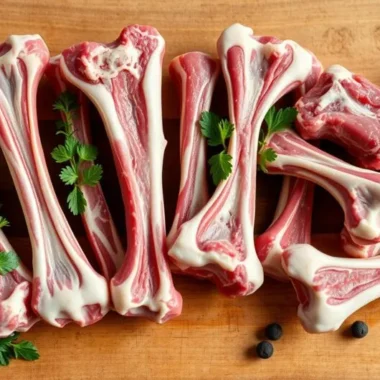As winter fades, spring’s promise brings St. Patrick’s Day closer. For many, this day is all about corned beef, a favorite across the U.S. The secret to its flavor is the special seasoning blend.
Before St. Patrick’s Day, grocery stores buzz with shoppers. They’re looking for the best ingredients for their corned beef. The smell of garlic, cloves, and mustard fills the air, inviting everyone to enjoy the dish’s rich flavors.
Whether you’re an experienced cook or new to the kitchen, learning to season corned beef is key. With the right spices, you can turn a simple brisket into a dish everyone will love. It’s a must-have for St. Patrick’s Day.
Table of Contents
What is Corned Beef Seasoning?
Corned beef seasoning is a mix of spices and herbs that gives this dish its unique taste. It includes coriander seeds, mustard seeds, and peppercorns. Also, anise seeds, fennel seeds, dill seeds, whole cloves, bay leaves, and crushed red pepper flakes are part of it. These spices are toasted and ground to make a strong and complex seasoning.
Key Ingredients in Corned Beef Seasoning
- Coriander seeds
- Mustard seeds
- Peppercorns
- Anise seeds
- Fennel seeds
- Dill seeds
- Whole cloves
- Bay leaves
- Crushed red pepper flakes
Importance of Seasoning for Flavor
The seasoning is key to the flavor of corned beef. It’s important whether you buy it or make it yourself. The spices not only flavor the brine but also the meat. This makes the corned beef tender and flavorful, great for St. Patrick’s Day or any time.
| Spice | Flavor Profile | Quantity |
|---|---|---|
| Coriander seeds | Citrusy, slightly sweet | 1 tbsp |
| Mustard seeds | Pungent, slightly nutty | 1 tsp |
| Peppercorns | Spicy, earthy | 1 tbsp |
| Anise seeds | Licorice-like, sweet | 1 tsp |
| Fennel seeds | Licorice, slightly sweet | 1 tsp |
| Dill seeds | Dill, slightly bitter | 1 tsp |
| Whole cloves | Warm, slightly sweet | 3-4 whole |
| Bay leaves | Earthy, slightly minty | 2-3 whole |
| Crushed red pepper flakes | Spicy, slightly fruity | 1 tsp |
This mix of curing salt, brine ingredients, and spice packet is vital for a great corned beef dish. It ensures the meat is full of flavor, something you can’t get without the right seasoning.
The History of Corned Beef
Corned beef has deep roots in Irish culture, but it has evolved a lot in the United States. The term “corned” means the large grains of salt used in curing. In the 19th century, Irish immigrants found beef more abundant and affordable in America.
Origins of Corned Beef in Irish Culture
Traditionally, beef was scarce and expensive in Ireland. Irish bacon was more common. But, Irish immigrants were drawn to the salt-curing method used by Jewish butchers selling brisket.
Evolution of Corned Beef in America
Irish immigrants adopted the curing process, making corned beef a staple. The recipe uses a 5-pound brisket in a brine mixture of water, salt, sugar, pickling spices, garlic, and pink curing salt for five to seven days. This long curing time tenderizes the brisket.
Now, corned beef is closely tied to St. Patrick’s Day in the United States. It’s often served with cabbage and potatoes or colcannon. Its popularity has grown beyond Irish-American roots, becoming a favorite in American cuisine.
“Corned beef, when properly cooked, should have a pink-red color and a slightly sour earthy taste of umami.”
How to Make Your Own Corned Beef Seasoning
Ready to elevate your corned beef? Making your own seasoning is the secret to amazing flavors. You can tailor the taste to your liking. Let’s explore the key spices and a simple brine recipe.
Essential Spices to Include
The heart of great corned beef seasoning is a mix of aromatic spices. Toast coriander, mustard, peppercorns, anise, fennel, dill, and cloves to enhance their flavors. Grind these spices with bay leaves and red pepper flakes for a fragrant mix.
Homemade Corned Beef Brine Recipe
To make the brine, mix 1 tablespoon of your seasoning with 1 quart of water, kosher salt, and pink curing salt. Pink curing salt preserves the meat and gives it a corned beef color. Add brown sugar for a sweet touch that balances the savory.
After preparing the brine, soak the beef brisket in it. Refrigerate for 5-7 days to let the flavors soak in. This blend can be stored for up to 6 months, ready for your next corned beef dish.
“The key to a truly exceptional corned beef dish is in the seasoning. Crafting your own blend allows you to fine-tune the flavors to your liking.”
With this seasoning and brine, you’re set to make delicious corned beef. Impress your family and friends at St. Patrick’s Day or any corned beef event. Enjoy this flavorful and customized dish.
Tips for Selecting the Right Cut of Meat
Choosing the right cut of meat is key to making perfect corned beef. The most common cuts are brisket and round. Knowing what each offers can help you pick the best one for your dish.
Choosing Between Brisket and Round
Brisket is the traditional choice for corned beef. It has more marbling, giving it a richer flavor. The point cut of brisket is especially tender and juicy.
The round cut, on the other hand, is leaner. It has a firmer texture that some people like. Your choice depends on your taste and what you want your dish to be like.
Grass-Fed vs. Grain-Fed Beef
Another thing to think about is where the beef comes from. Grass-fed beef often tastes more distinct than grain-fed. Trying both can help you decide what you prefer.
Remember, choose a 3-6 pound piece of meat. This size is perfect for most recipes.
By understanding the differences in corned beef cuts, you can pick the best one. This will make your St. Patrick’s Day feast or any corned beef dish even better.

The Best Techniques for Cooking Corned Beef
Choosing the right cooking method is crucial for perfect corned beef. Whether you boil it or slow cook, knowing the techniques is key. This ensures the meat is tender and full of flavor.
Boiling vs. Slow Cooking
Boiling is a classic method for cooking corned beef. It tenderizes the brisket and removes excess salt. Boil for 3 to 4 hours until it’s fork-tender.
If you prefer not to watch the pot, slow cooking is a good choice. Cook on high for 4 1/2 hours or low for 8 to 9 hours. This method also results in tender meat.
Tips for Achieving Tender Meat
- Make sure the corned beef is fully covered in liquid. Use water, broth, or a mix with the brine and spice blend.
- Add vegetables like potatoes, carrots, and cabbage to the liquid for a complete meal.
- For baking, boil the corned beef for 2 hours. Then bake for 30 minutes to get a crispy exterior.
- Let the cooked corned beef rest for 10-15 minutes before slicing. This makes it tender and juicy.
By following these techniques and tips, you’ll make delicious corned beef. It’s perfect for St. Patrick’s Day or any special event.
Pairing Your Corned Beef with Sides
Corned beef is a must-have on St. Patrick’s Day. But, the right sides can make your meal even better. They add to the rich flavors of the corned beef, making your meal more enjoyable.
Traditional Sides to Serve with Corned Beef
Classic choices like cabbage, carrots, and potatoes are perfect. These veggies soak up the juices from the corned beef. They make your meal feel like home.
For more flavor, add corned beef seasoning or pickling spice to the cooking liquid.
Creative Pairing Ideas for a Modern Twist
Try new sides to give your corned beef a modern twist. A cheesy cabbage casserole with bacon is a tasty option. Or, a fresh slaw with cabbage and carrots adds a nice crunch.
Don’t shy away from other veggies like Brussels sprouts or kale. They add nutrients and balance out the corned beef.
“The key to a truly satisfying corned beef meal is in the sides. They don’t just complement the main dish – they elevate it to new heights.”
There are countless ways to pair corned beef. Mix traditional and modern sides for a St. Patrick’s Day feast that everyone will love.
Storing and Preserving Corned Beef
Keeping your homemade corned beef fresh is important. You can enjoy it long after St. Patrick’s Day. With a few easy steps, your corned beef will stay tasty and fresh.
Best Practices for Refrigeration
Cooked corned beef can last 3-4 days in the fridge. Store it in an airtight container or wrap it well in plastic. Make sure it’s at 40°F or below. You can also save the curing salt and brine ingredients for extra flavor in other dishes.
Freezing Corned Beef: What You Need to Know
To store it longer, freeze your corned beef for 2-3 months. Wrap it in plastic, then foil. Or, use a freezer-safe bag, squeezing out air before sealing. Thaw it in the fridge overnight before reheating.
“Proper storage and preservation are the keys to enjoying your homemade corned beef long after the celebrations have ended.”
Follow these tips to enjoy your homemade corned beef all year. A little care ensures tender, flavorful corned beef for months.
Common Mistakes to Avoid
Preparing the perfect corned beef dish needs careful attention and avoiding common mistakes. One big mistake is overcooking your corned beef. This makes the meat tough and dry, not tender and juicy. To get the right doneness, use a meat thermometer. Aim for an internal temperature of 145°F (63°C).
Another mistake is using the wrong seasoning. Even though the corned beef comes with a spice packet, don’t ignore it. Mix your own spice blend with the packet to deepen the flavor. Don’t rinse off the seasoning before cooking. This can lose the corning spices that make the meat flavorful.
- Overcooking can lead to tough, dry corned beef
- Use a meat thermometer to ensure the ideal internal temperature of 145°F (63°C)
- Don’t discard the included spice packet; instead, enhance it with your own blend
- Avoid rinsing off the seasoning before cooking to retain maximum flavor
By avoiding these common mistakes, you can make your corned beef dish better. Enjoy the perfect mix of tenderness and flavor.

Enhance Your Corned Beef Dish
There’s more to making your corned beef dish great than just seasoning. Adding fresh herbs, spices, and new cooking methods can bring out amazing flavors. Let’s look at some ways to make your corned beef even better.
Adding Herbal Flavors
Chopped herbs like thyme, rosemary, or parsley can really change your corned beef. Just add them to the liquid or rub them on the meat before cooking. They add a wonderful aroma and taste.
Incorporating Other Spices for Depth
While pickling spice is essential, try other spices too. Juniper berries, allspice, or ground cloves can add a unique flavor. For a touch of sweetness, add brown sugar to your spice mix. But remember, keep the traditional flavors of corned beef in mind.
For a bold twist, use dark beer in your cooking liquid. Its rich, malty taste can add depth to your corned beef. Start with a little and adjust to taste.
Enhancing your corned beef dish means trying new flavors and cooking methods. Be open to different seasonings and techniques. This way, you’ll get a truly amazing corned beef dish.
Serving Ideas for Corned Beef
Corned beef is more than just for St. Patrick’s Day. It can be turned into tasty dishes that wow everyone. Try making Reuben sandwiches or creative corned beef hash. The options are endless.
Classic Reuben Sandwich Recipe
The Reuben sandwich is a favorite that highlights corned beef’s rich taste. It has tender corned beef, tangy sauerkraut, Swiss cheese, and Russian dressing on rye bread. This mix of salty, sour, and creamy is unbeatable.
Creative Corned Beef Hash Variations
For a filling breakfast or brunch, make corned beef hash. Cut leftover corned beef into small pieces. Mix it with diced potatoes, onions, and veggies like peppers or mushrooms. Cook until crispy, then add eggs for a tasty meal.
Want to add more flavor? Use your corned beef seasoning or spice blend in the hash. Or, try new ingredients like diced apples or sweet potatoes for a twist.
Leftover corned beef is great in tacos, quesadillas, or on loaded baked potatoes. Its savory texture goes well with many flavors. This lets you make a variety of tasty dishes.
Corned Beef Seasoning for Other Dishes
Corned beef seasoning is more than just for St. Patrick’s Day. It can make many dishes taste better. Try it in soups, stews, and other savory recipes.
Using Corned Beef Seasoning in Soups
Adding corned beef seasoning to vegetable soup makes it taste amazing. The spices mix well with the sweetness of the veggies. It’s great in beef barley soup or chicken noodle too.
Incorporating Seasoning in Stews
Make your beef or lamb stew better with corned beef seasoning. It adds a savory flavor that goes well with the meat and veggies. Just add a tablespoon to your stew and adjust to taste.
“The corned beef seasoning really took my stew to the next level. The blend of spices added such a wonderful depth of flavor.”
You can also use it as a rub for beef or pork. Mix the spices with olive oil and rub it on the meat. Then roast or grill it for a tasty dish.
There are many ways to use this seasoning. Try it on roasted veggies, potatoes, or in chili. With a bit of creativity, you can make any dish special.
Celebrating St. Patrick’s Day with Corned Beef
Corned beef is a big part of American St. Patrick’s Day celebrations. It’s the main dish in an Irish-American feast. You can make it the star of your St. Paddy’s Day dinner, whether it’s a big party or a small meal at home.
Festive Recipe Ideas
Show off your corned beef skills on St. Patrick’s Day. Try the classic corned beef and cabbage with potatoes and carrots. Or, get creative with corned beef hash or a Reuben sandwich.
Add some Irish charm by using green beer in your cooking. Or, sprinkle fresh herbs like parsley and thyme on top.
The Role of Corned Beef in St. Patrick’s Day Traditions
Corned beef isn’t from Ireland, but it’s a big part of St. Patrick’s Day in the U.S. It started as a cheap substitute for Irish meats. Now, corned beef, cabbage, and potatoes are a favorite St. Patrick’s Day dish.
This dish brings people together, celebrating cultural traditions and delicious food.
FAQ
What is corned beef seasoning?
Corned beef seasoning is a mix of spices that makes corned beef taste great. It usually has garlic, cloves, dry mustard, salt, and black pepper.
What ingredients are typically found in corned beef seasoning?
You’ll often find coriander seeds, mustard seeds, and peppercorns in corned beef seasoning. It also includes anise seeds, fennel seeds, dill seeds, whole cloves, bay leaves, and crushed red pepper flakes.
How does the history of corned beef evolve in America?
Corned beef started in Ireland but changed a lot in America. The name “corned” comes from the big salt grains used to cure it. In the U.S., it became a hit with Irish immigrants and is now a big part of St. Patrick’s Day.
How do you make homemade corned beef seasoning?
To make your own seasoning, toast coriander seeds, mustard seeds, and peppercorns. Add anise seeds, fennel seeds, dill seeds, and whole cloves. Then, grind them with bay leaves and red pepper flakes. Mix 1 tablespoon of this blend with a quart of water, salt, and pink curing salt for the brine.
What is the best cut of meat for corned beef?
Brisket is the top choice for corned beef because it’s marbled and flavorful. Round is leaner but works too. Look for a 3-6 pound cut for most recipes.
What are the best cooking methods for corned beef?
You can boil or slow cook corned beef. Slow cooking, like in a Crock Pot, for 7-8 hours makes it tender. Boiling takes about 50 minutes per pound. Make sure the meat is covered in liquid for the best taste.
What are the traditional sides for corned beef?
Classic sides are cabbage, carrots, and potatoes. They soak up the beef’s flavors. For something new, try a casserole with potatoes, cabbage, and onion in bacon fat, topped with cheese.
How can you properly store and preserve cooked corned beef?
Cooked corned beef stays good in the fridge for 3-4 days. Freeze it for up to 2-3 months. Wrap it well in plastic wrap and foil or use a freezer bag. Thaw it in the fridge before reheating.
What are some common mistakes to avoid when cooking corned beef?
Don’t overcook corned beef to avoid toughness. Use a meat thermometer to check for 145°F (63°C). Don’t rinse off the seasoning, as it loses flavor. Be careful with salt, as the meat is already cured.
How can you enhance the flavor of your corned beef?
Add fresh herbs like thyme or rosemary to the cooking liquid. Try spices like juniper berries or allspice for more flavor. Use dark beer for a rich taste and a bit of brown sugar for sweetness in your spice blend.
Source Links
- Corned Beef Seasoning – https://whitneybond.com/corned-beef-seasoning/
- Corned Beef Cure & Cook Kit – https://worldspice.com/products/corned-beef-cure-cook-kit?srsltid=AfmBOoo2fA1fks13lu26gcptthxly7M0GdDYa-B0MlhJr9vMGAsI1ARv
- Homemade Corned Beef – https://www.crunchtimekitchen.com/homemade-corned-beef/
- Homemade Corned Beef Seasoning Recipe – https://www.foodfanatic.com/recipes/corned-beef-seasoning-recipe/
- EASY Crockpot Corned Beef and Cabbage – I Heart Naptime – https://www.iheartnaptime.net/corned-beef-and-cabbage/
- The Best Corned Beef Spices Mix! – https://foodieandwine.com/corned-beef-spices/
- Column: Savory history of corned beef in America • Current Publishing – https://www.youarecurrent.com/2024/03/15/column-savory-history-of-corned-beef-in-america/
- Corned Beef | Origins, Ingredients, Irish, & St. Patrick’s Day | Britannica – https://www.britannica.com/topic/corned-beef
- The Luck of the Irish Meets America — All About Corned Beef | Butcher Boy – https://butcherboymarket.com/know-how-articles/about-corned-beef/
- Homemade Corned Beef • Easy Step by Step! – https://theviewfromgreatisland.com/homemade-corned-beef/
- How to Make Corned Beef for St. Patrick’s Day (It’s Easier Than You Think) – https://www.purewow.com/food/how-to-make-corned-beef
- Corned Beef – https://www.tasteofhome.com/recipes/homemade-corned-beef/?srsltid=AfmBOooSuQywsq5qkLh-MvxKnpX2c5eHptz3ai-d2bhWzNX9y7ztpDz8
- Corned Beef – Point Cut or Flat Cut? – https://realadvicegal.com/corned-beef-point-cut-or-flat-cut/
- Beef Carving 101: How to Cut Corned Beef, Roast, and More – https://www.escoffier.edu/blog/recipes/beef-carving-101-how-to-cut-corned-beef-roast-and-more/
- How to Eat Corned Beef: A Guide to Savoring This Classic Dish – https://www.howtoeatthis.com/stream/how-to-eat-corned-beef/
- Learn 3 Delicious Ways to Cook Corned Beef Perfectly – https://www.thespruceeats.com/how-to-cook-corned-beef-2215826
- 27 Perfect Pairings: What to Serve with Corned Beef – https://mortadellahead.com/what-to-serve-with-corned-beef/
- St. Patrick’s Day Isn’t Complete Without a Corned Beef and Cabbage Dinner – https://www.thepioneerwoman.com/food-cooking/recipes/a11462/corned-beef-and-cabbage/
- Corned Beef and Cabbage (Oven-Roasted) – https://www.onceuponachef.com/recipes/corned-beef-and-cabbage.html
- How to Brine A Corned Beef – https://thedishnextdoor.com/brine-corned-beef/
- Homemade Corned Beef – https://whitneybond.com/corned-beef/
- Stop Making These 14 Mistakes With Your Corned Beef And Cabbage – The Daily Meal – https://www.thedailymeal.com/1534751/corned-beef-cabbage-cooking-mistakes/
- How to Cook Corned Beef in a Crock Pot | Steak University – https://www.mychicagosteak.com/steak-university/crock-pot-corned-beef?srsltid=AfmBOoruQ8OL3ddeFncOuZTdPshbPnbxZzpLfxNdqJoGw7Mb6Rw5UTea
- How to Fix Overly Salty Corned Beef: Easy Tips for Perfect Flavor – https://www.mykitchenhacks.com/dish-doctor/fixing-overly-salty-corned-beef/
- Corned Beef Cure & Cook Kit – https://worldspice.com/products/corned-beef-cure-cook-kit?srsltid=AfmBOoq6wBvBqg7QlXgYoqRcQ1P0wIgjlVLik9cQ46MIkwNAT01kJpT1
- Smoked Corned Beef Recipe – https://meateatingmilitaryman.com/smoked-corned-beef/
- We Have To Stop Acting Like Corned Beef Is Only Meant For Reubens – https://www.delish.com/holiday-recipes/g3300/corned-beef/
- How to make tender Corned Beef and Cabbage in the Instant Pot – https://www.casadecrews.com/instant-pot-corned-beef-and-cabbage/
- 23 Easy Leftover Corned Beef Recipes – https://www.tasteofhome.com/collection/recipes-to-make-with-corned-beef/?srsltid=AfmBOoro–X-UXe2_8t2ihrrr7R3lE2h_eNJXiYzCGm2OVYINiTDbRpG
- Best Homemade Corned Beef Seasoning Mix For Corned Beef & Cabbage! – https://bakeitwithlove.com/homemade-corned-beef-and-cabbage-seasoning-mix/
- The Key To The Best-Tasting Canned Corned Beef Is The Seasoning – Tasting Table – https://www.tastingtable.com/1539457/canned-corned-beef-seasoning/
- Corned Beef and Cabbage: A Classic Irish Dish Made Simple • Everyday Cheapskate – https://www.everydaycheapskate.com/a-simple-meal-to-celebrate-st-patricks-day/
- St. Patrick’s Day Corned Beef & Cabbage Soup – https://beyondgumbo.com/2024/03/17/st-patricks-day-corned-beef-cabbage-soup/
Did You Try This Recipe ?
There are no reviews yet. Be the first one to write one.








